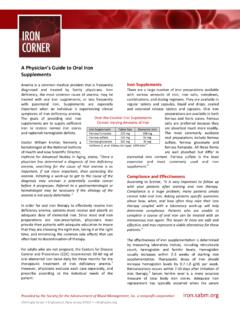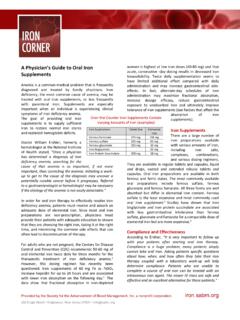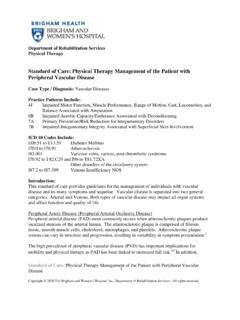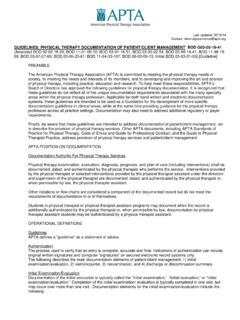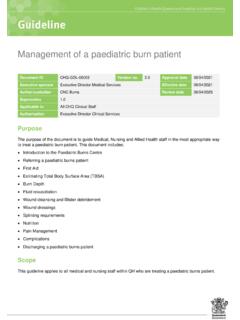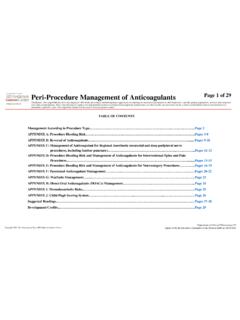Transcription of ANEMIA IN THE PRE-SURGICAL PATIENT - SABM
1 ANEMIA IN THE. PRE-SURGICAL . PATIENT . Recognition, Diagnosis, and management New Insights and Concepts for the Primary Care Provider ANEMIA is a significant and modifiable risk factor for increased perioperative morbidity and mortality and should be diagnosed and treated before elective surgery. - Irwin Gross MD, Medical Director, PATIENT Blood management , Transfusion Services, Eastern Maine Medical Center, Bangor, ME. SABM Copyright 2014. Supported by a grant from American Regent . What is the unmet need in surgical patients ? ANEMIA is epidemic a common complication of common diseases ANEMIA is so common 30-60% of patients with rheumatoid arthritis that it's becoming accepted as normal.
2 30-80% of patients with inflammatory bowel disease Many physicians are 30-50% of patients with chronic heart failure under the misconception 20-40% of diabetics without overt renal failure that ANEMIA is relatively harmless and best 40-60% of patients with chronic kidney disease managed with transfusion All of these are related to iron absorption and metabolism. when symptomatic.. Why care (more) about ANEMIA ? ANEMIA is a significant modifiable risk factor in surgical patients Prevalence of undiagnosed ANEMIA At least 1/3 of patients undergoing non-emergent surgical procedures have potentially treatable ANEMIA increases perioperative morbidity and mortality A large retrospective study of almost 8000 non-cardiac surgical patients found that the prevalence of preoperative ANEMIA was almost 40%.
3 Preoperative ANEMIA was associ- ated with a nearly five-fold increase in the odds of post-operative Even mild preoperative ANEMIA (Hb 10-12 g/dL in women; 10-13 g/dL in men), is independently associated with a 41% increased risk of mortality and a 31% increase in morbidity in patients undergoing major non-cardiac surgery. Perioperative transfu- sion is associated with an additional increase in morbidity and There is a common Preoperative ANEMIA is the most frequent predictor misconception that of perioperative transfusion4 transfusion should be the default management A systematic review of 62 studies shows that preoperative ane- strategy for ANEMIA , that mia is the most frequent predictor of perioperative transfusion.
4 It is low risk, high benefit, Other factors include advancing age, female gender, and small despite robust clinical body size. evidence to the contrary.. SABM Copyright 2014 2. Preoperative ANEMIA diagnosis and treatment improves PATIENT outcomes5-7. Improves readiness for surgery Reduces transfusion risk in the perioperative period Reduces ANEMIA and transfusion associated morbidity and mortality Helps identify co-morbidities Effective clinical management of ANEMIA improves PATIENT outcomes in chronic diseases , chronic heart failure, chronic kidney disease, inflammatory bowel disease, rheumatoid arthritis, etc. ANEMIA may be an indicator of an undiagnosed underlying disease process , iron deficiency suggesting occult malignancy What laboratory tests are needed for a PRE-SURGICAL ANEMIA evaluation?
5 Goals of preoperative ANEMIA laboratory test algorithm Allow diagnosis of common causes of ANEMIA Avoid the need for patients to return for another blood sample Draw CBC and sample for additional testing to hold for additional tests if needed Eliminate unnecessary lab studies First Tier Laboratory Tests Complete Blood Count (CBC). Reticulocyte Count Absolute reticulocyte count Reticuloctye hemoglobin content if available (a functional measure of iron status). Vitamin B12. Folate SABM Copyright 2014 3. First Tier Laboratory Tests Iron Studies Transferrin Saturation Ferritin Iron Iron Binding Capacity Serum Creatinine Additional studies predicated on initial test results, or if a diagnosis cannot be made based on initial tests: Second Tier Laboratory Tests Thyroid Stimulating Hormone (TSH).
6 Direct Antiglobulin Test C-Reactive Protein Soluble Transferrin Receptor Methyl Malonic Acid Serum Protein Electrophoresis Erythropoietin Haptoglobin SABM Copyright 2014 4. PREOPERATIVE ANEMIA management ALGORITHM8. Hgb is less than 13. gm/dl Is folate less than Folate 1 mg MCV less than or equal Yes daily No ng/ml to 105. Rule out acute blood loss. Yes Add testing for Consider tests for If transferrin vitamin B12 if hemolysis: direct anti- saturation (TSat) MCV greater than Reticulocyte count globulin test (DAT), LDH, greater than 20% or equal to 90 Haptoglobin, Bilirubin. and ferritin greater Reticulocyte elevated plus reticulocyte Consider Hematology than 100 ng/ml and count, iron, iron count, creatinine consult.
7 MCV less than 80 binding capacity, and folate consider thalassemia ferritin, creatinine or Vitamin B12 less hemoglobinopathy. than or equal to 300? Ferritin less than 100 ng/ml? Yes No Yes No Probable Is there associated Vitamin B12 leucopenia, Deficiency. thrombocytopenia TSat less than 20%? or ovalocytosis? Consistent with iron deficiency. Consider possible sources of Consider chronic blood loss, Vitamin B12. malabsorption, dietary supplements. Yes Yes deficiency, No medications. Consider Consistent with ANEMIA of hematology inflammation (functional Creatinine greater than consult to rule out iron deficiency) or mg/dl or eGFR less Myelodysplasia combined ANEMIA of than 60 ml/min?
8 (MDS). inflammation and iron deficiency. Yes No Consider IV Possible ANEMIA of Consider DAT, haptoglobin, iron therapy. chronic kidney disease. LDH to rule out hemolysis if elevated reticulocyte count. Consider acute blood loss if elevated reticulocyte count. Consider renal consult Consider Hematology if clinically appropriate. consult to rule out plasma cell dyscrasia or other primary marrow process if clinically indicated. Consider Pre-op ESA. treatment with appropriate iron supplementation. SABM Copyright 2014 5. 4. Notes to Preoperative ANEMIA management Algorithm: 1. If absolute iron deficiency is detected and cause is unknown, gastroenterologist or other appropriate referral to rule out malignancy as a source of chronic blood loss is 2.
9 If ferritin, iron saturation values, or both or other markers of iron-restricted erythropoiesis are inconclusive, further evaluation to rule out iron deficiency or iron sequestration due to inflammation/chronic disease may be 3. A therapeutic trial of oral iron therapy would confirm absolute iron deficiency but may be impractical in the presurgical PATIENT . No response to iron therapy may not rule out absolute iron deficiency because of PATIENT non-compliance, ongoing blood (iron) losses in excess of oral iron absorption, and/or diminished gastrointestinal absorption and transport of iron due to 4. ANEMIA in the setting of decreased transferrin saturation (< 20%) in the setting of decreased glomerular filtration rate (GFR < 60) will often respond to intravenous iron.
10 Referral to a nephrologis may be 5. Additionally, iron-restricted erythropoiesis due to iron sequestration, functional deficiency, or both must be SABM Copyright 2014 6. What ANEMIA treatment strategies should be considered for the anemic PRE-SURGICAL PATIENT ? Correct nutritional deficiencies Iron therapy Choice of therapy is based on: Timescale before surgery Tolerance of oral iron Iron status Consider oral iron if: Adequate time (2-4 months). No ongoing blood loss No inflammatory process or co-morbidity Normal GFR. PATIENT is tolerant NOTE: Relatively slow iron repletion with a high incidence (30-40%) of gastrointestinal intolerance; co-morbid inflammatory states reduces iron uptake.

